|

Danny got under the car and tried to
find the cause, but didn't see anything that would
account for it. From the inside of the car, he
removed the cover to the fuel pump and verified
fuel was getting to the left side fuel "saddle", and it was completely full of
gas. So if it was fuel starvation, it wasn't
your ordinary garden variety type. We tried
calling our network of mechanic/friends, looking for
suggestions, but it was Sunday, and no-one was
available. Hmmm... we were a bit stumped
to say the least.
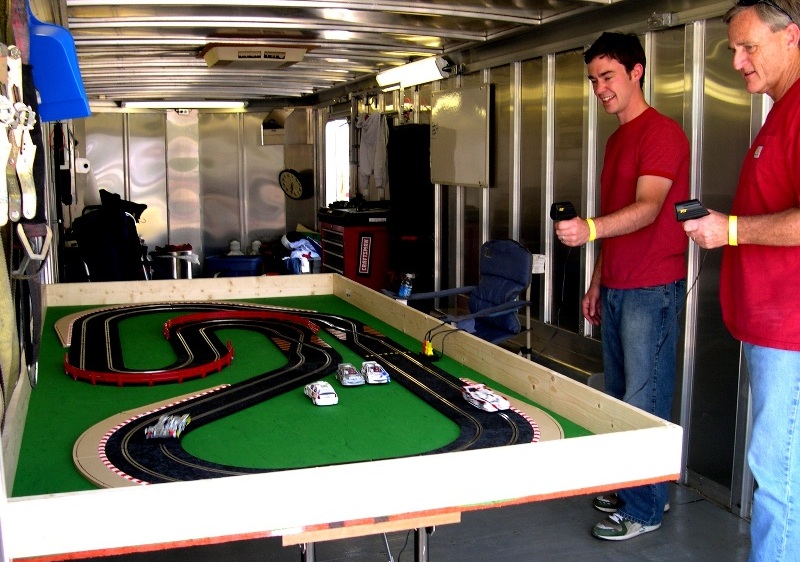
Being a slot car junkie on the side,
I came up with this kooky idea of installing a
portable track inside my trailer (which I had also
hauled up to VIR for the day). The track is screwed down, so I
can fold up the table and strap it to the side, out
of the way. Here you see my friend Matt
Hensley and his father Tom enjoying a little
wheel-to-wheel action on this particular "Father's
Day" outing at the track. Revell Whitener
(wife of Rob Whitener, aka. Mr. Roar Racing), walked
by and didn't realize that this was my trailer.
Danny and I happened to be standing nearby while
these guys were racing, and Revell came up and
commented "Can you believe how hard core those guys
are? They have a slot car track installed in
their trailer!"
We decided on one final test for the
RX-8. Just to make doubly-sure, we topped off
the fuel tank
to the brim, and took it on track one more time - and
were rewarded with exactly the same symptoms - it
was cutting out in left hand turns.
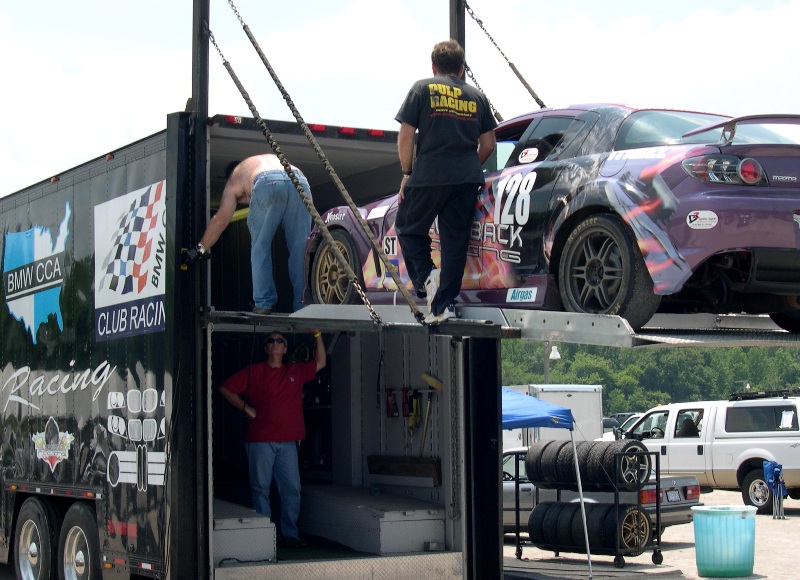
Ultimately we decided not to drive
the RX-8 anymore. We packed it up early, and
Danny left the track so that he could take it back
to his shop to work on the problem at hand.
After all, we have only two days to fix the car, reload
it onto the trailer, and depart for Mid-Ohio.
Side note to above photo: As I
was standing on the tailgate of the trailer, I tried
to get a close-up pic of the "silvery mane" on
Danny's back - after all, it is our trademark.
But he caught me in the act and said he would
absolutely kill me if I did it. Discretion being the
better part of valor, I wisely backed off.
Danny is kind of like a gentle grizzly bear - cute
and fuzzy, but don't poke him with a stick!
Monday, June 19th, one
day before leaving for Mid-Ohio
I called Danny to find out the
progress on the car - he said that he found some
wiring under the car (I think it was a wiring
harness that also connects to the second Oxygen
sensor), that was unsecured and rubbing up against
the exhaust. The insulation had burned off,
and he said he could recreate the problem when he
ground the wire against the exhaust. The
theory was the wiring was hanging loose, and in left
hand turns it was making contact with the exhaust.
So he fixed the wiring and re-secured it. Hmmm, this
sounds like it might be fixed, but we won't know for
sure
until
we test again.
Tuesday, June 20th
Today the rig is supposed to leave
for Mid-Ohio. The schedule for the upcoming
Mid-Ohio Race weekend is
as follows:
- Wednesday June 21st - Race
rigs parked at the track
- Thursday June 22nd - Optional
Promoter test day - 2 informal test sessions
- Friday June 23rd - 2 practice
sessions
- Saturday June 24th - 2
practice sessions and Qualifying
- Sunday June 25th - 1 short
practice session and Race
Bill wasn't going to be able to
drive our rig up to Mid-Ohio due to other
commitments (we knew this well in advance), so Danny
made arrangements with another truck driver.
Unfortunately this other truck driver backed out at
the last possible minute. Danny calls me in a panic.
What the heck are we going to do? Danny was
trying to get me to volunteer to drive the rig, but
no way was I going to do that. I don't have a
Commercial Drivers License - I'm not qualified -
what if something happened and someone got hurt?
Or what if I lost my license for driving a rig
without the proper credentials? Heck, I need
my drivers license for my job as a thrill seeking
international playboy spy, errrr, I mean as a
boring, Pre-Sales engineer/geek for some big computer
conglomerate. Anyway, there is no fricken' way
I'm going to drive that rig.
This meant that Danny would have to drive the rig up
himself, and because of his schedule he wasn't going
to be able to leave until Wednesday afternoon.
Its a 12 hour drive (minimum) so we would miss the
rig parking deadline. Actually, I didn't
think this was that big a deal since teams are
parked in order of team points, which meant we would
be parked nearly last anyway - after all, we've only
made 2 of 5 races. Heck, how much worse of a
parking space could they give us? Little did I
know, they could give us a pretty bad one, and this
would have ramifications on how our weekend
would turn out.
I'm going to go on a brief tangent
here. Have you heard this old saying?
(I think I more or less got it right)
- For the want of a
nail, the shoe was lost...
- For the want of the shoe, the
horse was lost...
- For the want of the horse,
the rider was lost...
- For the want of the rider,
the battle was lost...
- For the want of the battle,
the
kingdom was lost...
- And all for the want of a
horseshoe nail.
The moral: You need to
sweat the details, because you never
know when small things will snowball into
bigger problems. Of course things are
going to go wrong - that's a given - but proper
planning and good execution can minimize the longterm
effects of mistakes. Wednesday, June
21st - "Rig Parking" day
Instead of parking the rig, today
was a travel day for most of our team. The
plan was for Danny to drive the rig up today,
leaving at 2:00pm and driving until o'dark
thirty, i.e. until he got there. Which
should be about 3:00am on Thursday. I was
driving up separately with my wife, and since I
lived a few hours closer, and started a bit
sooner, we would have a much more leisurely
drive. Danny ended up conning, errrr,
recruiting his dentist/friend, Dr. Vince Smith, to ride
up with him in the rig and crew for
the weekend. This turned out to be an
excellent maneuver, as "Doc Vince" was a real car
guy, and a very organized individual to boot.
He was willing to get his hands dirty on any
task, and was an extremely competent addition to
the crew.
Jon and Sri and Matt from
German Speed Merchants would be flying up
separately on Thursday night with a friend of
Danny's that happened to be a private pilot.
Thursday, June
22nd - Promoter Test Day
Today we would have two 1 hour
practice sessions. This may sound like a
lot, but remember there are two drivers
splitting the practice time, so that is really
two 30 minute practice sessions for each driver
(if we do a driver change in the middle).
I arrived at the track at
7:30am, and then realized my Grand Am credential
was not in my wallet where I keep it.
Arrghhh -- I had to pay my way into the track
since Grand Am does not issue a temporary
credential - if you forget it, too bad.
Ok, no big deal, I'll flush $75 bucks down the
commode, but it was a pretty bonehead thing to do. Once inside
the main gate, I found Danny and Vince parked in a
field outside the paddock, waiting to get in.
Danny said they arrived about 2:15am, and slept in
the rig, which is really pretty comfortable for two
people. They made really good time, except for
getting stopped twice by the highway patrol, once in
Virginia and once in Ohio. Those are two
pretty strict states to get pulled over in, and I was surprised when Danny said he talked his way
out of not one, but both speeding tickets.
Danny's military training means he knows how to act
around cops. Plus they seem to have a soft
spot for guys that race, and it doesn't hurt that he
has tons of patriotic logo's emblazoned all over
the truck.
We unloaded the golf cart and went
off in search of a Grand Am official that could
direct us to where to park the rig. That was when
we realized we had a 7:45 crew chief meeting!
Jon was our crew chief this weekend, but he was
flying in tonight. So Danny and I decided to
attend it, and park the rig afterwards.
It
was a good thing we did, because during the meeting,
Grand Am issued new transponders for the cars.
These transponders have an additional cable that
would connect to a uniquely coded "dongle" on your helmet, and
thus allow the officials to know which driver was in
the car. So now your crew chief wouldn't
have to inform timing and scoring when you do a
driver change in the middle of the race.
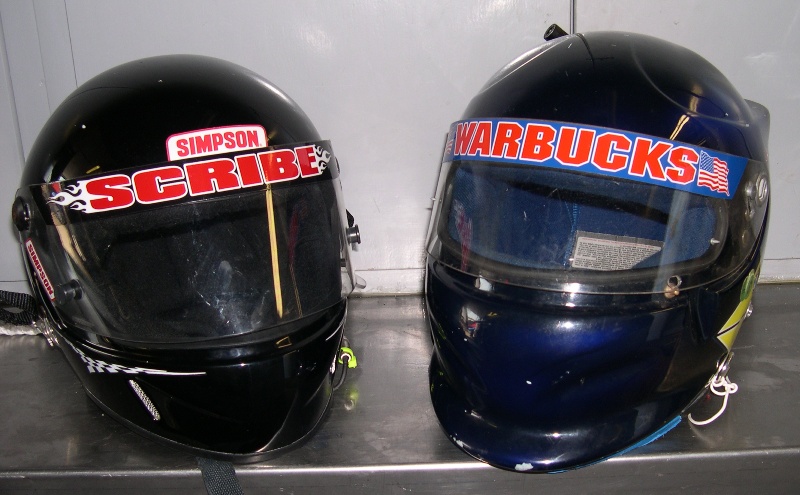
After the crew chief meeting, we
finally got the rig parked. Fortunately
our first practice session wasn't until about
11:30am, so we had time to unpack. But
unfortunately they parked us in one of the worst
spots in the paddock - on a slope. But
that's all there was left. This would make
our life a little more difficult all weekend,
because its challenging and potentially
dangerous to jack up a car when its sitting on a
slope. Sure, you could get one side in the
air if you chocked the wheels properly, but as
we would later discover, you couldn't get the
car onto 4 jack-stands without it possibly
toppling off. But we would have to make do.
I insisted Danny take the
first 1/2 of the practice session, not out of
any altruism on my part, but I figure when we
are diagnosing a problem, in this case the fuel
cutting out in left hand turns, I'd just as soon
not be the guy responsible if the motor blows
up. It would be just one more thing
the guys on the crew would have in their back
pocket to give me crap about - "Hey Mark, nice
job this morning blowing up the motor!"
Lets face it, when you get a bunch of grown men
together on a race team, they LOVE to give each
other a hard time - you'd
think we were a bunch of 12 year olds. But
its all in good fun! Most of the time...
With Vince's help, we got everything
unloaded out of the rig, and prepped the car for the
first practice. At the mid-point of the
session, we planned to call Danny in, and I would get in
the car and drive for the second half. I
helped Danny buckle in and he headed out on track.
While I put on my own drivers suit, Vince went down
in the pits to watch the action. When I got
finally there, I discovered it was a madhouse in the
pits - the stalls weren't numbered, at least not in
any obvious way, and with 90 teams trying to share
35 stalls, everyone was stepping on each other.
Danny only did a few laps when he brought the car
back in. Dang-nab-it, it was still cutting out
in left turns, and as he found soon out, Mid-Ohio has
more than a few. There's no use beating a dead
horse, so we took the car back to the paddock to
work on it. Scratch one practice session.
Danny and I noodled over it for
awhile, then decided that we didn't know diddly-squat
about
what to do next. Our mechanical support, Jon,
Sri and Matt, were unavailable as they were
currently on a small plane flying up. So Danny did
the next best thing - he went and talked to Sylvain
Tremblay at SpeedSource. Even though Sylvain
is on a "competing" team, he has committed himself,
through his relationship with Mazda North America,
to help support anyone running a Mazda. And
he's a great representative in that regard, as he
has always proven willing to help. According
to Danny, Sylvain said that this was indeed a
puzzling problem - starving in left hand turns with
a full fuel load. He said you just have to
start eliminating the possibilities, and suggested
we start with the fuel pump and work it from there.
So that's what we did - Danny bought a new fuel
pump from Sylvain, and proceeded to replace it.
Vince wanted to get the car on 4
jack stands to make it easier to work on, and that
made a lot of sense. While Danny was replacing
the fuel pump, we could take the wheels off, bleed
the brakes, replace the rear brake pads, etc. - just
some basic going over between sessions. What
we didn't realize was that you can't put the car on
4 jack stands if its on any kind of a slope.
Vince got one side of the car up and secured, but when
he jacked up the second side, disaster struck - the
jack flipped on its side as the car toppled off the
stands, wedging both the jack and the stands (now
crushed and on
their sides) under it. No one was hurt, but we
had to borrow a second jack from the neighboring
Kaiser Racing team to free our own
jack, which was now damaged beyond repair from it
being on its side with the weight of the car on it.
Then we freed the crushed jackstands from the other
side. The car looked ok, but it turns out it
wasn't - what we didn't realize at this time was
that we had bent the driver's side rear control arm
(sound familiar?). You would think we'd learn
from past mistakes and look at these things more
carefully, but apparently we have a vast, almost
unlimited capacity for being pretty darn stupid!
I'm just kidding of course, it actually does have
somewhat of a limit... we just haven't found it yet!
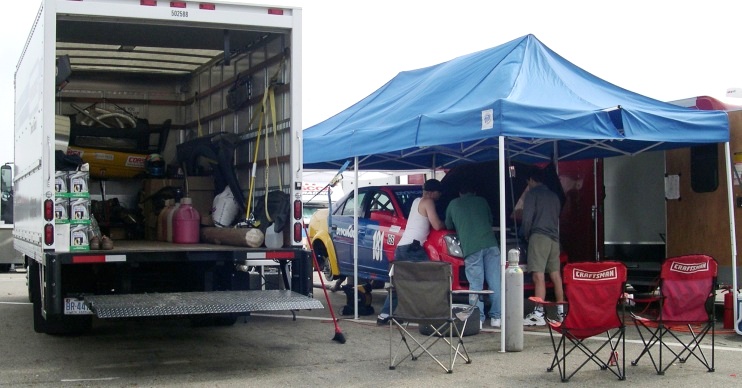
This is the Kaiser Racing Team, which
is running a GS Class Cadillac CTS. They
brought along the rental truck on the left to
supplement their smaller trailer on the right.
Their effort is a grassroots effort, not unlike our
own, and they are here hoping to beat some of the
"big boys" and maybe make a name for themselves.
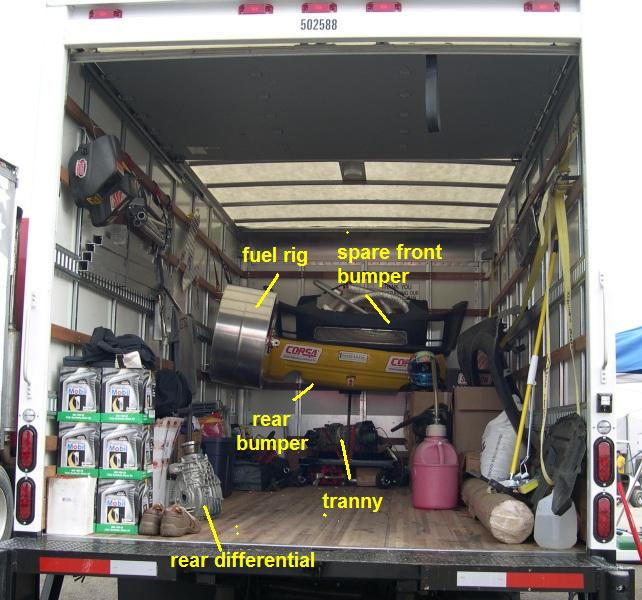
I'm impressed that they seem to have
a reasonably good set of spares in their support
truck. Danny got the fuel
pump swapped out, and (we thought) we were fat, dumb
and happy at this point. All we needed to do
was test the fix in the next practice session, which
was coming up rapidly at 3:30pm. Also coming
up rapidly was a nasty looking cold front, with some
rather ominous looking clouds. It started
sprinkling occasionally, but for the most part, the
track was only slightly damp.
We opted to stay with dry tires,
and once more Danny strapped in and headed on track.
Vince and I went down to the pits and I waited until
the 1/2 way point for my turn at the wheel.
Danny's session went pretty uneventfully. The rain
was light and intermittent, which meant the track
was a little bit slick, but not too bad. He
came in at the halfway point and turned the car over
to me. Danny noted that the water temperatures
were running a little higher than normal. It wasn't overheating, but
it was darn strange given the conditions (cool and
cloudy), and he told me to keep an eye on it.
The good news was that it seemed like the new fuel
pump had fixed the problem with the engine cut off.
So we were looking pretty good, or so we thought.
As I went on track, during my very
first lap, it started to rain again. I saw a
GS class Sahlens Porsche that went wide in turn 13, and
gotten stuck in the gravel with no serious damage.
The gravel is kind of like flypaper, and prevents
you from hitting the tire walls and guardrail on the
far side, however it also meant the Porsche wasn't
getting out on his own. The officials black
flagged the session and I pulled back into the pits,
where all the cars waited while a wrecker pulled the
Porsche free. During this
time the
clouds overhead were looking considerably more
treacherous, getting darker and starting to roil a
bit. I was starting to get a little concerned.
Impatiently I was thinking "C'mon, lets get some
practice in before the real rain hits."
My
prayers were finally answered and within a few
minutes we were back on track. Just in time
for the deluge to begin. It was gentle at first - hardly
enough rain to disturb the rainex on the windshield.
Within a lap the intensity of the rain ratcheted up
a notch, and I was starting to find the limits, and
then occasionally exceed them, of dry tires on a wet
track. And that's when the wind hit and a
little bit of hail mixed in for good measure.
We're not talking tropical force wind, but
rain falling sideways and gusts approaching hurricane force coming
out of the west. Several times the cross winds
felt like they were practically picking up the car
and tossing it - I almost didn't keep it on track in
turn 2. Huge branches littered the long
straight and I could no longer see any of the corner
workers - had they taken refuge? Even though I
didn't see any black flags, I knew it was time to
get off track.
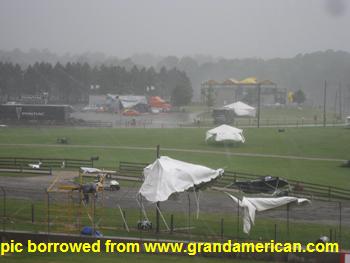 I pulled into the pits to the
frantic sight of people scrambling to take down the
40-50 temporary canopies that teams use to line pit
row. It looked like a losing battle, as most
of the tents looked like so much mangled litter, and
dangerous debris was flying through the air.
I heard later that one person sustained a broken arm
when a 1500lb tool chest flipped over.
I got back to our paddock, to find
a similar site. Our two small 10'x10'
canopies, despite being strapped down, were down on
the ground and their skeletons twisted and
intertwined. We had a table with tools
on it that had collapsed and the legs were bent
beyond repair, with our tools and various "stuff"
scattered around the paddock. Our trashcan
blew away, but we found it the next day.
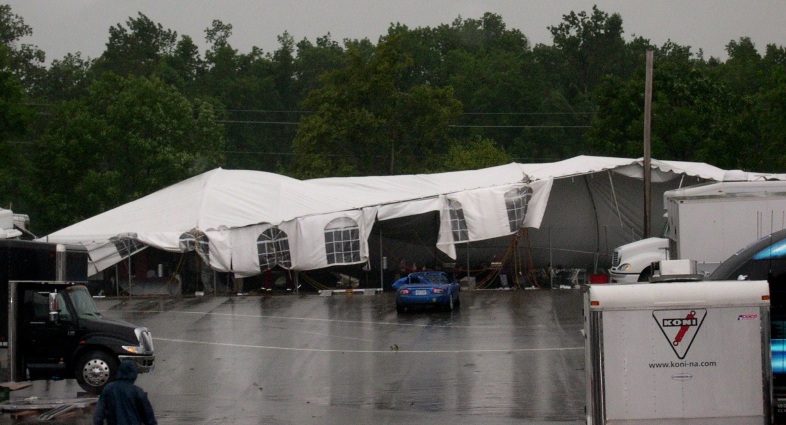
This was the condition of the
Sahlen's Hospitality / food service tent. It looks
like they won't be serving breakfast tomorrow
morning, or lunch either, for that matter.
They did get it back in service on Saturday though.
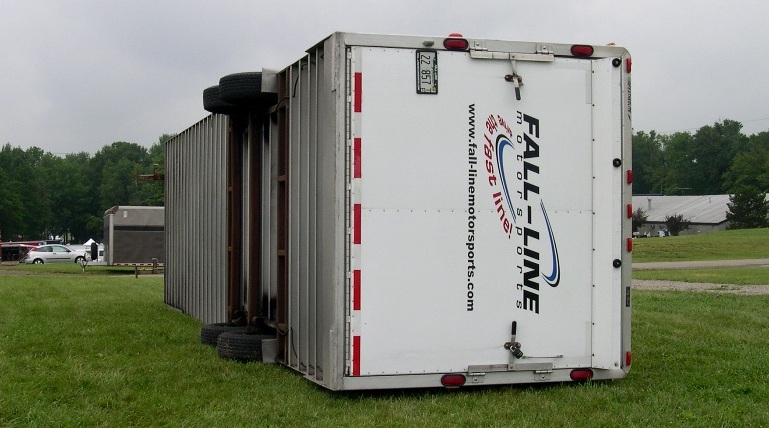
The BMW Club was running one of the support
races this weekend, and this poor club racer came
back to find this. Word is that his racecar,
strapped down inside, was ok. With forces like
this at work, thank goodness no one was more
seriously injured. It took us awhile to clean
up our own paddock area, but we got it done fairly
quickly and called it a day. We felt things weren't too
bad - after all we no longer had a problem with the
car cutting out on left hand turns, so that was
progress. What we didn't realize was
that the control arm was bent, and that we might
have a rather serious overheating problem ahead of
us to tackle. Sometimes ignorance is indeed
bliss. Danny and Vince
checked in at the hotel in nearby Lexington, and
arrived to find the whole area was experiencing a
power outage, including the hotel. There were still severe
thunderstorms in the area, and it looked like the
rest of the crew (Jon, Matt, Sri) would be delayed from flying into
nearby Mansfield airport until the next morning.
I headed back to Columbus to stay at my sister's
house, and managed to find a Sears along the way
where I bought a
replacement aluminum jack - it wasn't as nice as the
one crushed by the car, but it would do in a pinch.
Friday, June
23rd - "Practice Day"
Today the key "deadlines" for us
were:
- 9:00 --- Tech inspection
- 12:30-1:30 ---- 1 hour Grand
Am Practice
- 3:45-4:15 ---- 30 minute
Grand Am Practice
When I arrived at the track at
7:30am, Vince and Danny were already hard
at work. It was still overcast, but fortunately
any rain that fell was relatively
gentle. The private plane carrying Jon and
Sri and Matt didn't make it all the
way to Mansfield last night - they had to stay
overnight in Charleston, WVa. But they
were able to resume their journey first thing in
the morning, and they would arrive soon.
Vince and Danny managed to
cobble together one of the canopy frames using
duct tape and some metal scraps for splints.
Then we set to work getting the car cleaned up
for its tech inspection, scheduled for 9:00am.
Vince has some experience as a technical
inspector, so he ended up leading the effort to
make sure the car was cleaned up, all the decals
were in place (because of the recent body work, some were missing) - basically
Vince made sure all
the t's were crossed and the i's dotted so
to speak. He did a great job because
it sailed through technical inspection in record
time.
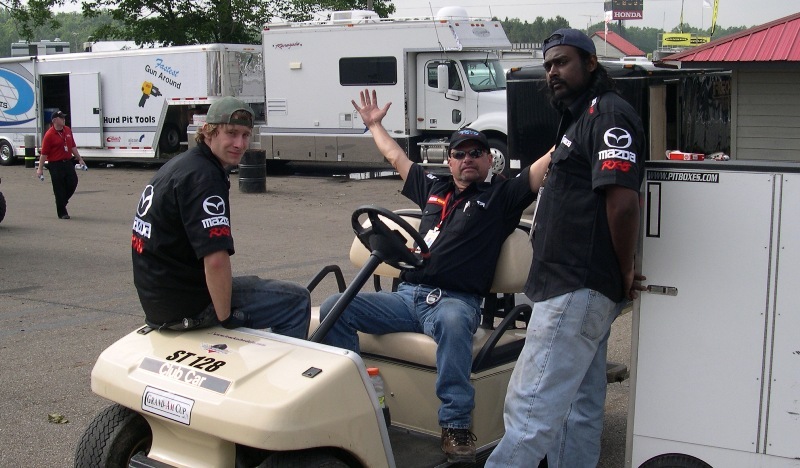
L-R Matt,
Dr. Vince and Sri modeling the latest in "Danny Wear"
Jon and Sri and Matt arrived
shortly thereafter, and immediately jumped into
action to get the car ready for the upcoming
12:30 practice. It felt good being able to
step back from the car and let the real
mechanics take care of the prep. Shortly
before the session started, it was raining
steadily, if not very hard, so we
decided to try out the rain tires. I headed
out for the first half of the practice, and had
a pretty good 30 minutes in the wet. It
actually stopped raining about 20 minutes into
the session, and the conditions started to improve
from there. Danny drove the second half,
and by the end of the session a dry line had
developed on the track, allowing the cars to go
faster and faster. Danny's fastest laps
near the end of the session were putting us on
the quicker half of the grid (14th out of 35),
which wasn't a bad thing. During
the session, the car's coolant temperature was
on the high side, but it was still relatively
cool due to the overcast conditions, so the car wasn't actually
overheating. Nonetheless, we were starting
to worry about it. We figured we
might be in trouble if it got sunny and warm.
This was one case where we wanted to be
wrong. In the downtime
between sessions, Jon and his crew looked over
the car, trying to find a reason for the
somewhat high coolant temps. They checked
the water pump, the radiator, and the
thermostat, but all seemed in order. We
decided to gut the thermostat, which essentially
meant we were running without one altogether,
which is not uncommon in racecars. Would
that help?
While the crew was working on the car, I worked
on scrounging up a remaining part we needed to convert
our fuel rig from a single dry break setup to a
dual dry break system. BSR Racing, the
supplier of the rig, didn't have the necessary
fitting in stock (but they could get one in a
day or so) to connect the return hose back to the
rig, so I drove to a "Tractor Supply" store
about 25 minutes north of the track, and would
you believe they had one? It turns out
farmers need all sorts of pumps and hoses and
such to run their business, and they use the
same kind of industrial grade couplers.
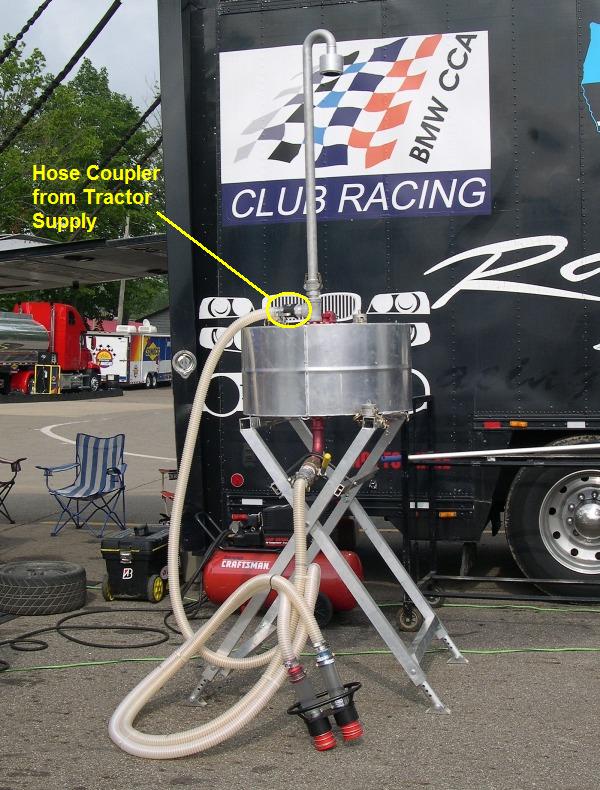
By the time our 3:45 practice
session came around (only 30 minutes long), the
sun had come out, and the afternoon turned out
to be quite beautiful for the first time since
we arrived. We got out there a little
late, and Danny drove the car for about 15
minutes, and found that the car was getting
dangerously warm. Now we were beyond
worried. We decided that it would help
if we could extract the information from the AiM
dash data logger, and that might give us some clues
on how to get to the bottom of our overheating.
For example, was it possible that the engine was
running lean on fuel, and that
might be causing us to run hot? Normally
Doc Holness does that kind of thing for us, but
he didn't make it up to Mid-Ohio. So Jon and I
thought we might be able to figure it out.
Jon had the software on his laptop, but we
didn't have a data cable. So I spent the
better part of an hour running around the
paddock looking for the AiM
factory rep - they always have one at every
Grand Am race. Finally I found him
working over at the Bernheim Racing trailer (they run a
bunch of GS Porsches), and he agreed to pay us a
visit and bring us a cable.
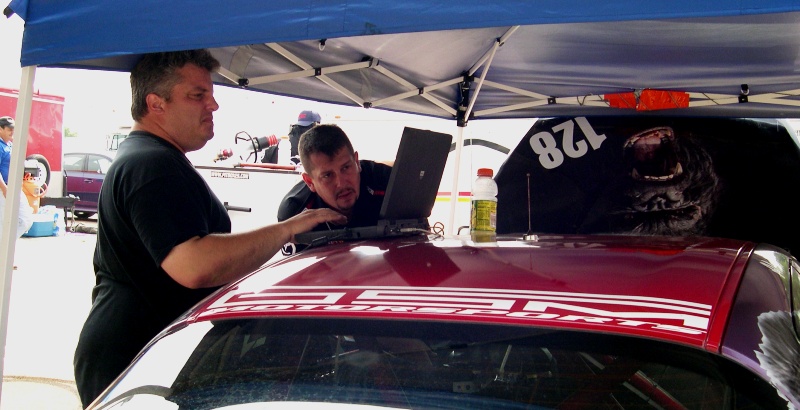
This is Scott Jessup from AiM
showing Jon how to interface to the on-board AIM
dash computer. Scott spent the better part
of two hours with us, getting the firmware on
our dash up to date, installing the analysis
software on my laptop, showing us how to use it,
etc. While we are on track, the computer collects dozens of different data
parameters - engine speed, coolant temperature,
oil temperature, fuel pressure, air / fuel
ratio, the speed of the car, the lateral
g-forces of the car - the list goes on and on.
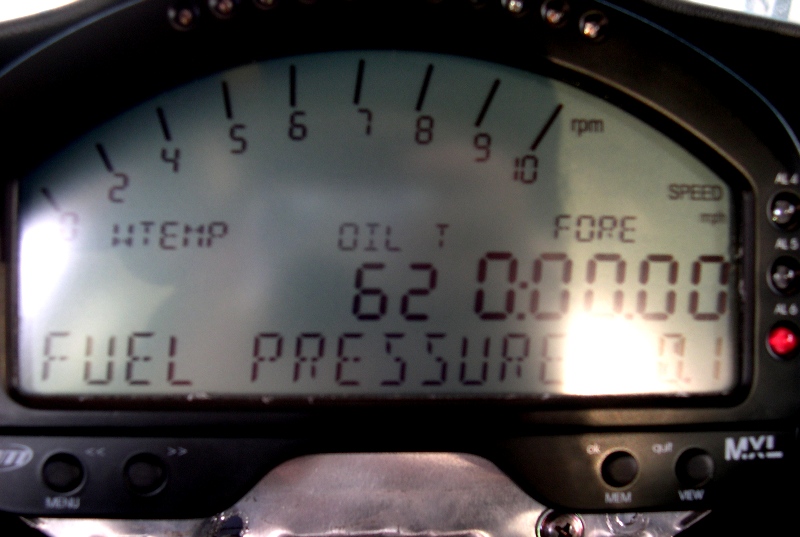
The dash itself can also be
programmed to show any of these collected data
points to the driver. I programmed ours to
show RPM, Speed, Water Temperature,
Oil Temperature, Current Laptime, Fuel Pressure, and
Air Fuel Ratio. You can also set alarms for
any parameter - in the above picture, you see an
alarm for "Fuel Pressure 0.1" - this is because the car
was not running when I took the picture, so the fuel
pressure naturally read zero.
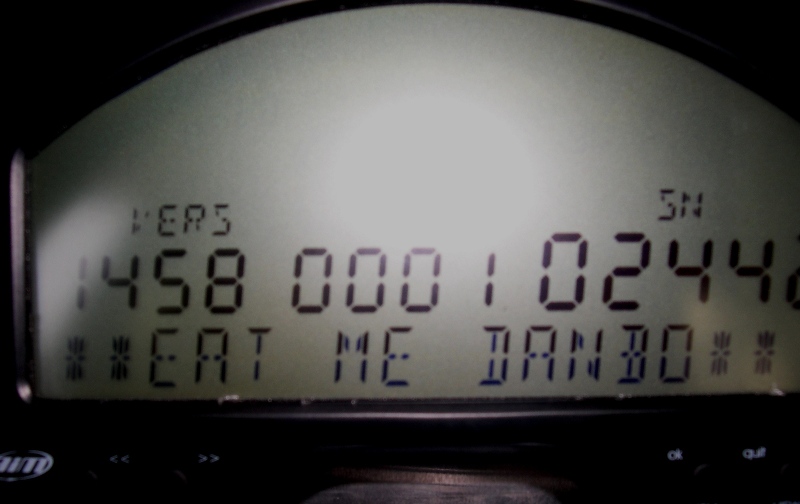
Scott also showed me how you could
program in a creative "welcome message" that flashes
briefly whenever you start the car - you only see it
for a second then its gone. Danny never
even noticed the message this weekend,
it went by so fast. After Danny reads this, I'm
sure to get one of his light hearted "Your @ss is
grass" emails! Yep, this one's going to cost
me...
Unfortunately our data logger had not
been collecting information correctly up to this
point, because the memory had filled up with
previous sessions. Even though we had everything more or
less working now, we didn't have any recent data to analyze. However, we
figured we would be in good shape to collect some
information during the next session first thing
tomorrow.
Saturday, June
24rd - "Practice and Qualifying"
Today the key "deadlines" for us
were:
- 9:00 - 10:00 ---- 1 hour
Grand Am Practice
- 12:55 ------------ Driver
nominations due
- 1:00 -1:45 ------ 45 minutes Grand
Am Practice
- 2:55 -3:10 ------ 15 minutes
Qualifying Session (ST Class only)
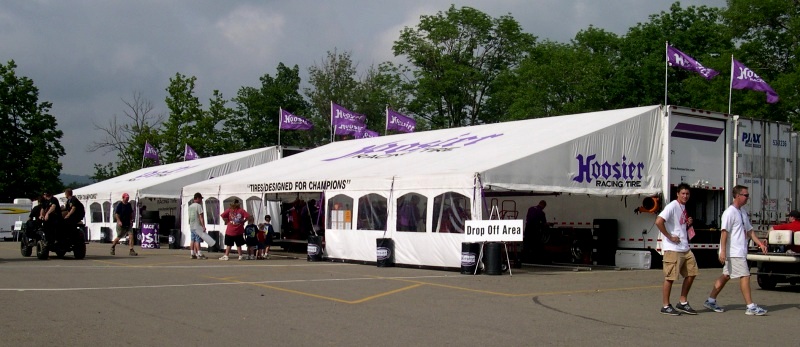
Danny splurged and got us some fresh
rubber for today's practice sessions. Up to
now we had been practicing on leftover tires from the VIR race, or when it rained, the used
rain tires we bought off Sylvain at the beginning of
the season. This is the Hoosier Tire racing tent, a
traveling road show erected onsite to support the
Grand Am Cup and Rolex racing teams. I counted
7 tractor trailers full of tires and gear, all to
meet the needs of about 175 race cars.
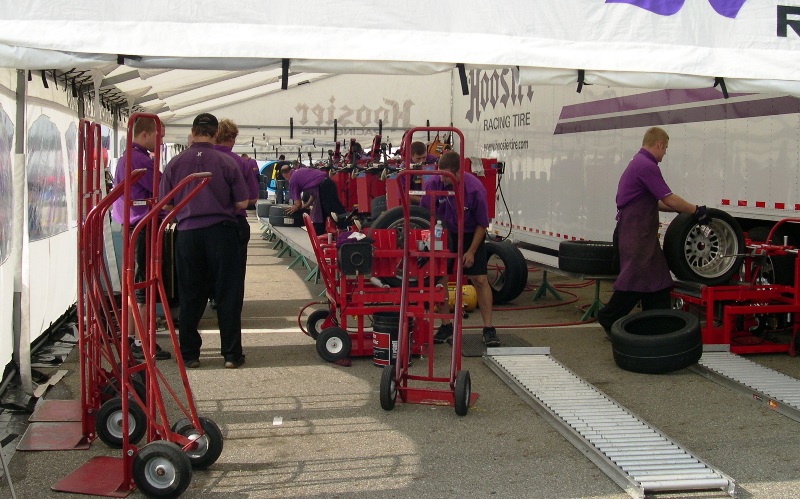
Here is a view of the "assembly line"
underneath the tent. You drop off your old
tires and rims at one end, and at the other end you
get your rims back mounted with brand new tires.
These guys were constantly busy - it only takes them
about 20 minutes to mount a full set, but because of
the backlog, you may have to wait 1-3 hours to
get your tires back, so you need to plan ahead.
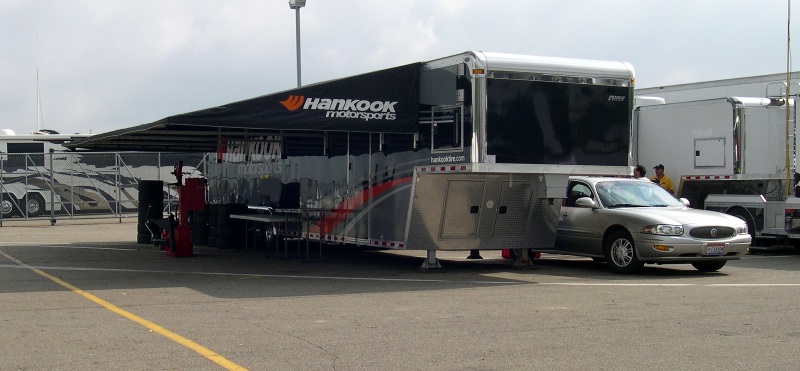
This is the Hankook Race Tire
trailer, which as you can see, is not nearly as large
as the Hoosier operation. Hankook is a
relatively new race tire manufacturer (at least here in the states), and they are the "david" to
the Hoosier "goliath". We can't use
Hankook tires in Grand Am cup - the series requires
we run on the Hoosiers, however there is a Miata Pro
series that is racing this weekend as a support
race, and Hankook is their specified tire.
These guys weren't nearly as busy, because
they only have to support a couple of dozen cars,
and they all use the exact same size tire, which
makes it easy for them to bring a much smaller setup for
support. And Miata's being relatively light,
they don't use up tires as quickly as most cars.
The Hankook tires are a quality product, and they
are a welcome addition to the race tire marketplace
- more competition means better products at better
prices for us racers. 9:00am
rolled around, and I got the next crack in the car.
I decided it was time to collect some video, so I
mounted up the video camera and headed out on track
- finally, you say, some in car
video. The plan for this session was for me to
scrub in the new tires - I was supposed to start out
slowly for a lap or so, run hard for three laps,
then bring it in for a tire change. We were
going to scrub in one set of new tires and set them
aside for the race tomorrow. Then I would go
back out until the mid-point of the session (30
minutes), then bring it in to trade places
with Danny. It didn't quite work out
that way.
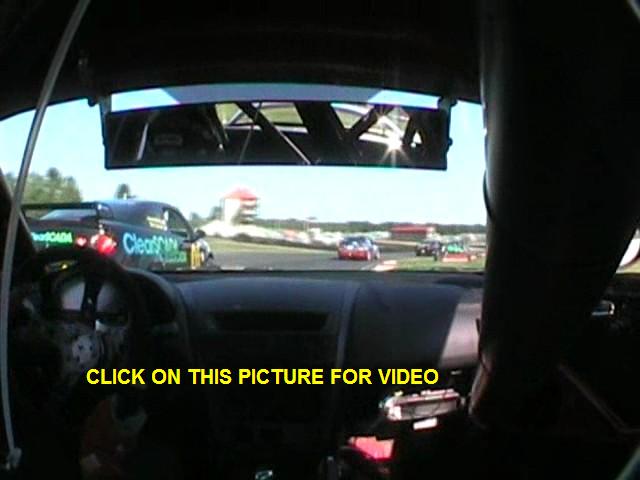
Today being a sunny day, it didn't take long (about
6 minutes) for the
car to start running warm, and this time it was
actually overheating. Instead of coming
in for a tire change, I brought the car in and we
decided to take it back to the paddock.
Scratch one more practice session.
While the mechanics puzzled over
the problem, I hooked up my laptop and downloaded
the information from the data logger.
What we could determine was that our oil temps were
ok (after all, we had 3 oil coolers on the car!),
but our water temps were getting up to about 240
degrees - at that point the system would start
dumping coolant out of the overflow. I was
also able to determine that the air fuel ratio was
within a reasonable range, so it wasn't because the engine was
running lean. We were clearly losing
power as well - after 2-3 laps, we would lose 6 mph
down the back straight alone. You can see in
the video that as the session wore on and the car
heated up, cars began walking away from us (or more
accurately "jogging" away from us) on the straights.
We could make up some of the ground in braking, but
we were clearly too slow to be competitive.
Also, I felt at this point the car wasn't handling
correctly. I was having to lift off the
accelerator in certain turns (such as turn 10),
where I should be able to go flat out. I
thought that I couldn't get on the throttle coming
off the turns as soon
as other cars.
It was a bit puzzling to me, and I recommended to
Danny that we adjust the front swaybar to try to
account for this. Meanwhile, Jon and
Matt and Sri were working diligently to
figure out our overheating problem. We were
hoping it was something we could fix, like a faulty
water pump, bad radiator, minor leak in a hose, etc.
But nothing seemed to be amiss - the water pump was
flowing well, the radiator wasn't blocked, they
couldn't find any leaks in any hoses. It was
starting to look like something we couldn't fix - an
internal engine problem. If that was the case,
we would need to swap out engines in order to
continue. But we didn't have a spare.
Danny was having one built, but we didn't get it in
time for the race. To to net
out our situation at this point:
1) We were overheating, and
unless it was going to be cloudy and rainy tomorrow,
we would have no chance of finishing the race.
The engine *might* survive if we got abnormally cool
weather - and that was NOT in the forecast. As
the engine got warmer, it clearly lost some of its
power as well, as we could see on the data logger.
The GSM mechanics didn't give up, and continued to
try to resolve the issue.
2) We had a handling problem.
I thought we could fix it with a swaybar adjustment
- what I didn't realize was that the problem was
bigger than that. After talking it over with
Danny, I asked Jon if we could adjust the front
swaybar. This would turn out to cause us yet
ANOTHER unforeseen problem, which I will elaborate
on later.
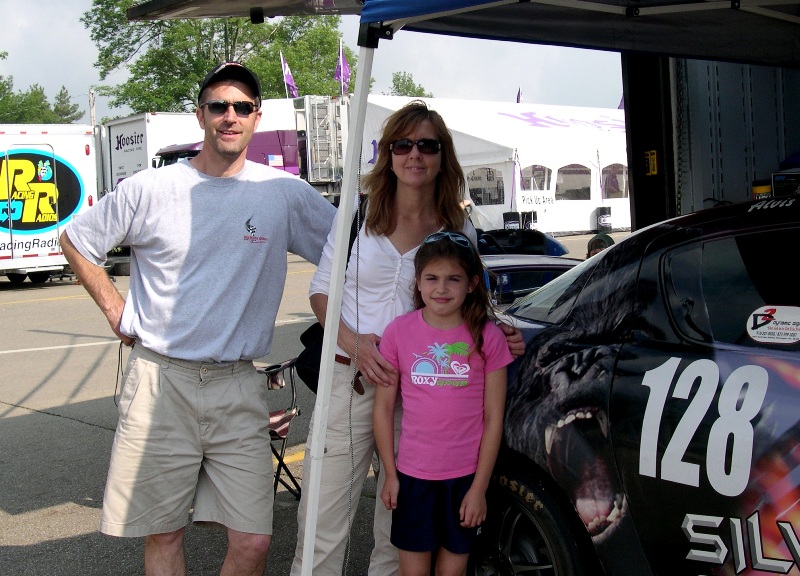
While we were mulling over the
situation at hand, I was visited by an old racing
buddy / nemesis. When I was running my
"J-Stock class" BMW M3 on the BMW Club Racing
circuit, one of my regular competitors was Davis Reiman. I like to think I got the better of
Davis, and I'm sure he liked to think he got the
better of me - many race weekends we would have
split decisions - I would win one race, but he would
win the next. It turned into a friendly
rivalry, and for a season or two we kept close tabs on
each other. This picture is Davis with his
lovely wife and daughter, posing next to our "great
ape" mascot.
The graphics on the car have turned
out to be a real crowd pleaser. When Danny
first proposed them, he sent me some photoshopped
pictures of how the car might look. My first
reaction was that the big gorilla was too scary looking
and intimidating. But it turns out even young kids seem to love
the look. In the end, Danny didn't listen to
me and went with his gut, and he was right.
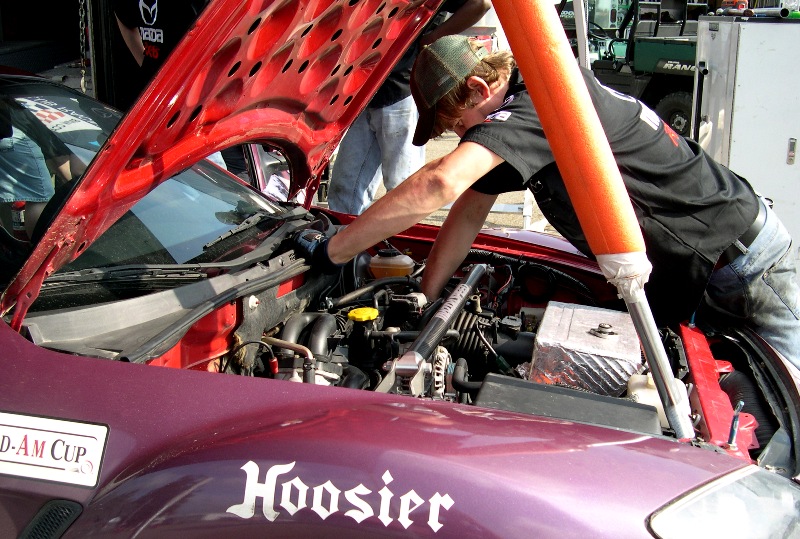
This is Matt working on our
overheating problem. The more we learned
about it, the more we started to think we couldn't
do anything about it, short of changing out the
motor. But that didn't stop us from
trying - between each session we would try something
different to address it.
The 12:55 deadline for our
qualifying driver nomination was approaching
rapidly. Grand Am makes you declare 2 hours
prior to qualifying, which driver will qualify the
car, and this driver must also start the race.
This Mid-Ohio qualifying session was more important than all other qualifying sessions at
previous races. First the first time, Grand Am
announced that the
qualifying results would be used to pare the field
down - some cars would not make the race.
While 90+ cars were registered, about 83 or so still
remained due to normal attrition during the past
couple days, and Grand Am wanted the field to be 75
cars. This meant that the bottom 3-4
qualifiers for each class would be told to go home
without racing.
We actually didn't know which of us
was the faster driver this weekend at Mid Ohio, because we had so few laps
here in
the car, under the same conditions.
Ultimately, we decided I would qualify the car,
since I had the most previous experience at
Mid-Ohio. So Danny went and turned in the
driver nomination form and came back just in time for the start of the
1:00 practice. The big question was, would any
of the tweaks that Jon and the GSM gang made, help
with our overheating problem?
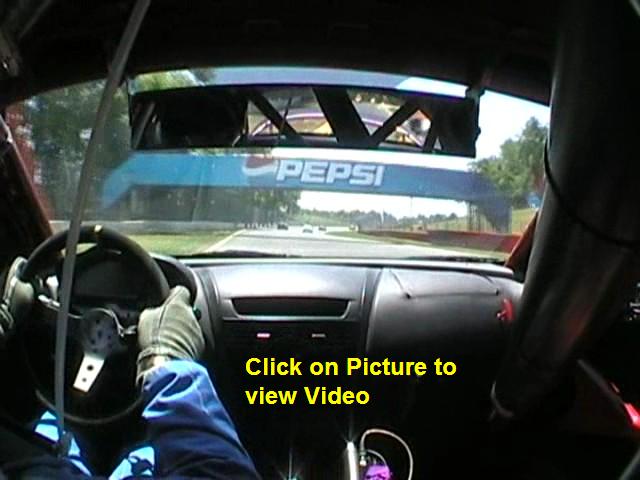
Danny took the car out this practice session, and
after a few laps, he brought it in - the car was
still overheating. Now what do we do? Qualifying started in less than two hours.
Even if we found a spare motor, there wouldn't be
time to change it before then. Ultimately, we figured if I could nurse the car
through qualifying, afterwards we could swap the
motor -- we would have until around noon the next day, which
was more than enough time. Danny checked
with the Speedsource, Roar and PlayTherapy teams -
but no one had a motor they could sell us.
We were starting to wonder if we
should even qualify the car, or just pull the plug
now. We figured even with the
overheating car, I should be able to run a couple of
laps and get the car qualified - then we could
make the decision on what to do next. The
downside was that if we did qualify the car, and
then later withdrew, we would have taken away
a spot on the grid for someone else, because of the 75
car limit. I don't think we were thinking
rationally, because we decided to go ahead and
qualify the car.
When I got on track for the short,
15 minute qualifying session, I realized I was in
trouble within the first lap. The car was
handling poorly - not at all like when I had
driven it earlier this morning. I couldn't
understand why it understeered badly on the entry to
the slower turns, and oversteered on the exit of
some of those same turns! It was eerie, but
the car felt somewhat like it did at Daytona when I
was driving around on two almost-flat tires. I
struggled with it for a couple of laps, then when
the water temps got too high, I backed off and
circled the track more slowly.
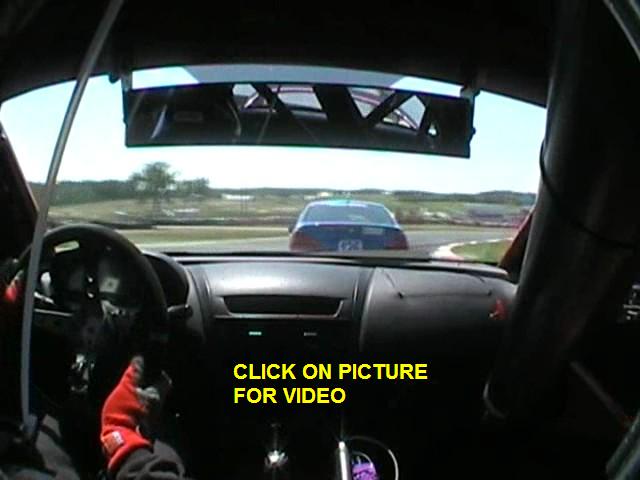
At this point I actually
tried to bring it into the pits, but when I came
around through the carousel turn, I couldn't get the
car to the correct side of the track to exit due to
traffic conditions. It was my fault really, I
was trying to stay offline for the overtaking
traffic riding up my bumper in turn 13, and I get
back to the opposite side of the track quickly
enough to make the pit exit in the carousel.
I'm sure my fellow ST co-drivers were cursing my
name as I slowed down their qualifying laps.
But Mid-Ohio is like that - if you drive off-line
for 1 turn, trying to be courteous by staying out of
the way of faster cars, you'll find yourself online
for the next turn, and then blocking them as they
try to get around you. After
almost 2 laps of driving slow and unfortunately
blocking other cars, Jon radio'd and said there was
one lap to go in the session. The water temps
had dropped due to my casual pace, so I decided to
give it one more hard lap, to see if I could do
better. But it just wasn't in the car.
As I motored down the front straight, the crew
thought the engine sounded pretty strange. And
when I was on the short straight between turn 1 and
the carousel, it still wouldn't pull 5th gear and
felt on the weak side.
I figured we were done so I backed off once more and
brought it in.
Ultimately I was slow - really
slow. Yes, I thought the car was down on
power, but the bigger mystery to me was how poorly
the car handled. All we did was make a minor
sway bar adjustment this morning, and there was no way
that would
account for the bizarre behavior - a car that both understeered and oversteered. I was really
puzzled, and starting to question what I knew (or
didn't know) about suspension behavior.
Frankly I was lost - and when that happens, I should
have realized that maybe, just maybe, there was
another explanation. But that never
entered my mind - all I could think of was that my
swaybar adjustment might have cost us the chance to
make the race. It took an
agonizing hour for Grand Am to release the final list of cars
that would race, and we used the time to ponder our
options.
Finally Mr. SpeedSource, Sylvain Tremblay, stopped
by on his way back to his own trailer, and said we
qualified in the final spot to make the field.
6 or 7 racers were notified they were done for the
weekend, but we weren't one of them. Actually,
we weren't very happy - even if the
motor held together (and it sounded like it was
already on its way out), we didn't relish the
thought of struggling along in last
place. We didn't think we had any tricks up
our sleeve to make the car faster, and we were
likely to blow up the motor in the first 20 minutes,
so what was the point? Danny took me aside,
and we both agreed we should withdraw immediately so
that Grand Am could fill out the grid with another car
in our place. So he rushed down to the Grand
Am tent, and gave them the news - we were done.
With this burden lifted off our weary
hearts, we proceeded to load up the
trailer. Many hands make light work, so it didn't take long. If we hurried we
could grab a quick dinner and then stick around to
enjoy the Rolex feature race (which started at
5:30pm and ran until about 8:15pm). As
we loaded the car onto the upper deck of
Danny's rig, I was able to peek underneath
it, and I discovered a couple of surprising
things.

The first thing that jumped out
was that we had another bent rear control arm
(remember VIR?), and it was sporting some fresh red
paint. This was definitely something that
happened this weekend at the track, and not
beforehand, but I couldn't figure out when. My
first thought was that it was from the red striped
curbing at Mid-Ohio. When they recently
repaved the track, the resulting curbing turned out
pretty high, so much so that if you accidentally
straddled it, you might scrape the bottom of the car on it.
Danny was willing to take the fall for
doing it, but I wasn't so sure that I hadn't caused
this
myself.
It wasn't until the next day that
I realized, in one of those thunderbolt flashes that strike you when you're thinking
about nothing at all - that this control arm was
almost certainly damaged by the crushed jackstand, which was
indeed red, when the car toppled off of
it (because the truck driver cancelled, because the
rig was late, because we were parked on a slope...). This would
certainly explain the unpredictable oversteer on
corner exit. But what about
the severe understeer condition on corner entry?
Inspector
Clouseau was
now on the case - I looked at the front
suspension, and it immediately dawned on me that we
may have done something terribly wrong, when we
adjusted the front swaybar earlier this afternoon.
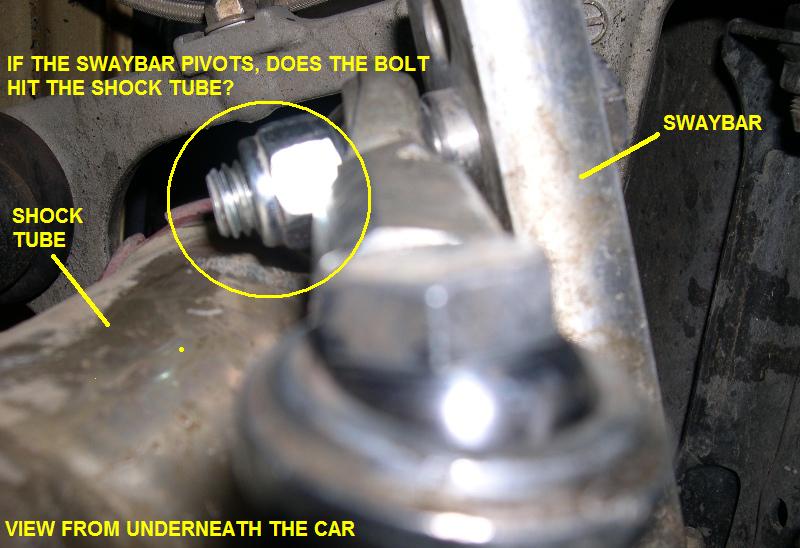
As we were adjusting the swaybar, we
couldn't understand why the bolts seemed to be on
backwards - this made them incredibly hard to undo - in
fact the whole shock tower had to be unbolted from
the lower control arm to allow enough clearance to
remove them. So we all agreed that this was
stupid - there couldn't possibly be a good reason
for it to be that way -
so when we put the bolts back on we reversed them.
This would make it much easier to adjust the bar in
the future, so we were pretty proud of ourselves.
And when the car was jacked up, this looked just
fine, because the suspension was all drooping, and
there didn't seem to be any obvious clearance
problems. But now that I was underneath the
car, and it was settled down on its suspension, I
could see that the reversed bolt might indeed cause
a serious clearance problem. If the suspension
compressed any further, the bolt might hit the shocktube
- then the suspension would bind, the spring rate
would rocket to infinity, and the car would
...tada...understeer! Of course this
would only occur when the front suspension became
compressed, which, by the way, occurs when you are
trail braking into a turn! Mystery solved!
So now we knew why it understeered on
corner entry. And oversteered on corner exit.
Well, these are my theories, anyway, and I'm sticking
to them! After we finished
packing up, we raided the Sahlen's Hospitality food
tent (crackin' good bratwurst and sausages, Gromit!).
Then 7 of us piled onto Danny's golf cart - it was
seriously overloaded and completely dangerous.
This
made it hilarious to anyone watching, and
occasionally terrifying for the rest of us, and we headed for the infield to
watch the Rolex racing action. I'm usually not one to
enjoy watching other people race, but I must admit
they put on one heck of a fine show.
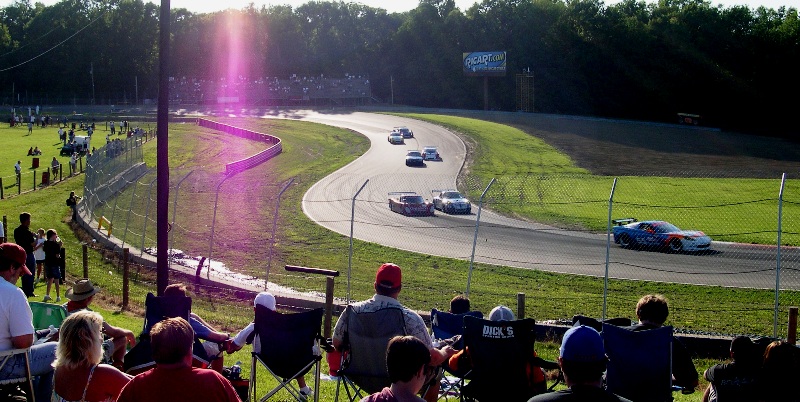
This is the view from turn 7, and you
can see the track was pretty crowded with GT cars
and Prototypes mixing it up, side by side,
constantly battling for position. This made
for many dramatic passes every lap, especially on
this portion of the track which went
right-left-right in quick succession. "Our" Grand Am Cup
race on Sunday (which of course will go on without
us) promises even more action, with even more cars
on track - 75. That is the most I have ever
heard of racing at Mid-Ohio, which is only about 2
1/4 miles around. By comparison, VIR had 90 or
so cars, but it was 3 1/4 miles around, which is 40%
more track for the cars to share.
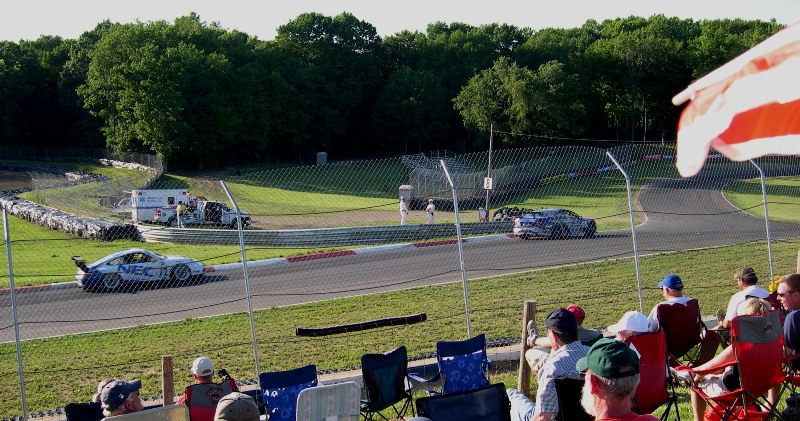
This is the hill at the crest of turn
7, and you can see the rather high red-and-white
candy-stripe curbing lining the inside edge.
This is why I originally thought the red paint on
our bent control arm may have come from the curbing.
This is a great place to watch the action at Mid-Ohio,
because from one vantage point you can see the end
of the back straight (a great overtaking
opportunity), plus three turns - one of them (turn 7)
is a doozey since its at the top of a hill. And the cars are CLOSE
to you - when a group of Rolex Prototypes thunders
by in unison, your chest tightens from the
overwhelming percussive force of their engines.
The crew wanted to see other parts
of the track, so we piled back on the cart in search
of other viewing opportunities. This drew
humorous glances from the spectators as we struggled
to keep all four golf cart wheels planted on the ground.
With 4 people on the back, we had to sit one person
over the front bumper to keep from popping a wheelie.
I wouldn't let Danny drive - we wouldn't live to
tell the tale! He only knows one speed when
he's behind the wheel of anything and that is flat
out, and driving this overloaded cart up and down
the hilly dales of Mid-Ohio required someone with a
more highly developed sense of self preservation
(me).
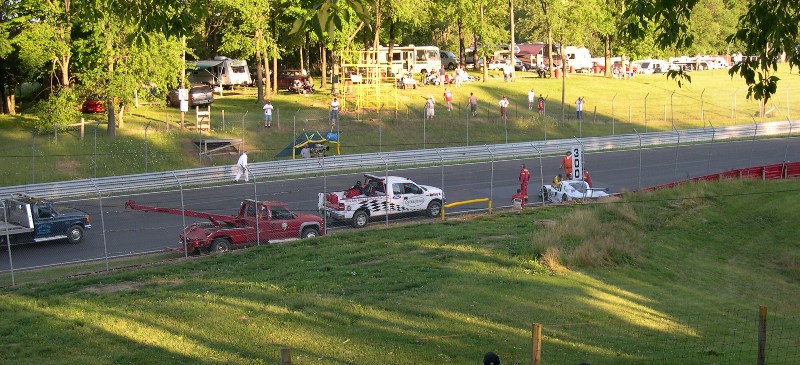
We settled on the area between turns
12 and 13 just as a Prototype lost control, and with
a bang it ricocheted off the guardrails.
This area of the track forms a narrow canyon with no
escape - you lose it here, and you are going to hit
something. The driver emerged from the car to
cheers from the crowd - he was fine with no apparent
injuries. It was mildly entertaining to
watch the crew manage the cleanup of the track and
recovery of the car, with a
perspective (from the hill) that I'm not used to seeing.
After loading the car on a flatbed hauler, they used
a giant broom mounted on the front of a pickup truck
(just like a snowplow), to push away the bits of
carbon fibre and metal that littered the track
surface. Then a huge tractor mounted blower
got whatever was left behind.
We moved around a little more, to
the corner overlooking the carousel and the front
straight. We figured we could watch the finish from
there and there were only a handful of laps left. Then all of a sudden, a TV cameraman
on a gantry above us yelled down -
"You ought to see the crash on the long straight - a
BMW just went end-over-end down it!"
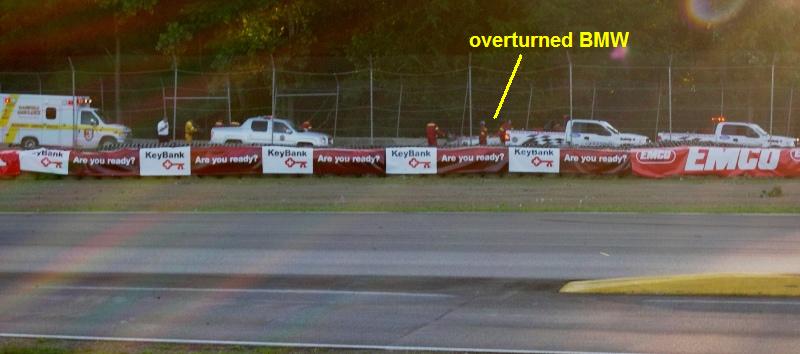
So we piled back on the cart and
headed over to the long straight. When got there, we
couldn't see the car - did it go off track into the
trees? No, actually it was right in front of
us, upside down! The driver, Joey Hand,
was actually leading the GT race when he had contact
with a Pontiac GTO. Hand's car left the track
and launched into the air when its nose dug into an
elevation change in the grass. It went
end-over-end several times as it traveled down the
straight. He escaped with relatively minor
injuries - bruises and soreness of
his neck and back. This is a tremendous
testament to the quality of the factory built roll
cage in his BMW.
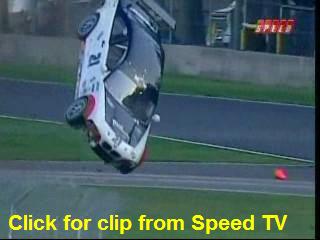
As a result of the ensuing full
course caution, the race soon ended
under yellow. Well our weekend was over, a day
earlier than we hoped. Tomorrow the Grand Am
Cup race would go on without us.
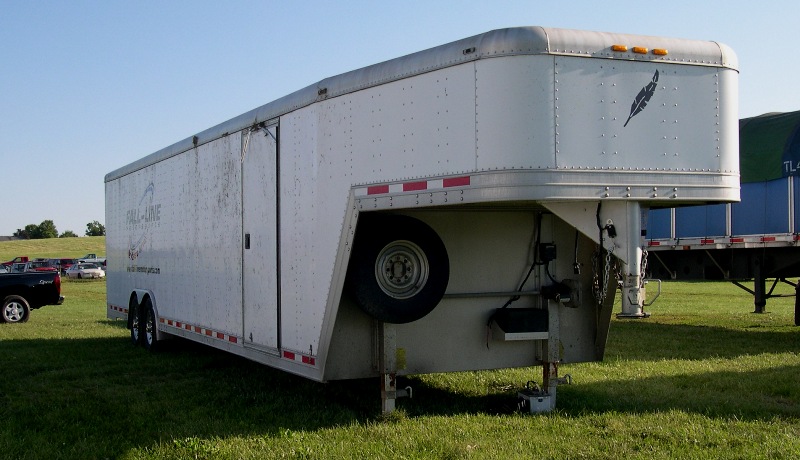
As I left the track, I was looking
for the trailer that was blown over by the wind.
I was surprised to find it righted once
again.
Although we can't see inside, it
appears that the trailer itself is in pretty good
shape, all things considered. I hope this
racers' weekend turned out to have a silver lining.
So ends a somewhat inglorious racing weekend.
I certainly wish that it had gone better for us, but
I can't help feeling that many of our misfortunes
were
self-imposed.
What keeps me going is that I know we
can do better, and that there is always another race
to run. |

